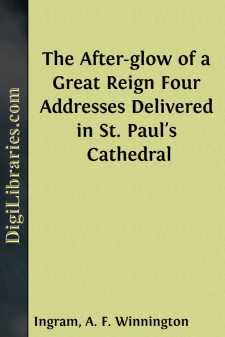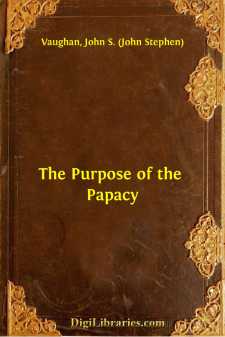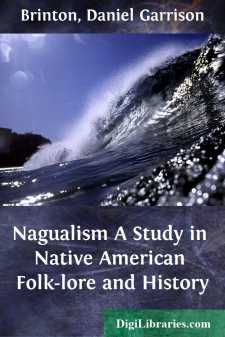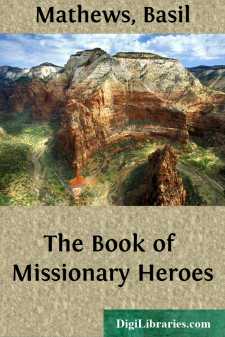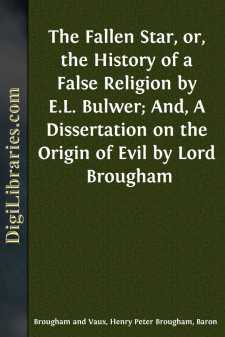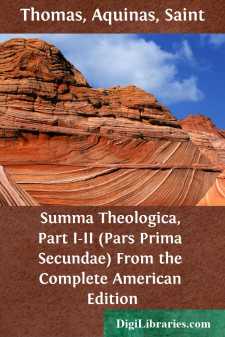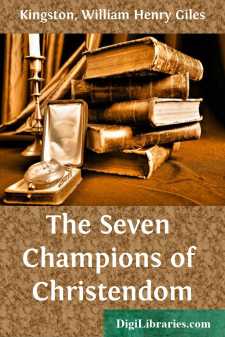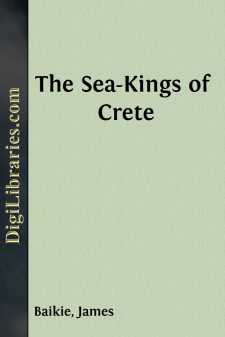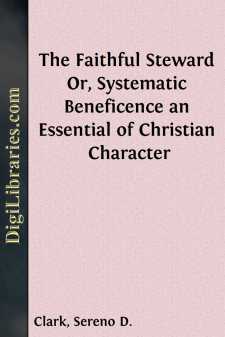Religion
- Agnosticism 2
- Antiquities & Archaeology 21
- Atheism 12
- Biblical Criticism & Interpretation 16
- Biblical Meditations 3
- Biblical Reference 1
- Biblical Studies 11
- Buddhism 8
- Christian Church 52
- Christian Education 5
- Christian Life 26
- Christianity 61
- Cults 2
- Devotional 6
- Eastern 2
- Education 4
- Eschatology 1
- Ethics 3
- General 60
- Gnosticism 1
- Hinduism 15
- History 28
- Holidays 10
- Inspirational 1
- Islam 8
- Judaism 3
- Leadership 1
- Meditations 3
- Monasticism 1
- Mysticism 11
- Philosophy 4
- Prayer 26
- Prayerbooks 5
- Religion & Science 12
- Sermons 54
- Spirituality 53
- Theism 2
- Theology 17
- Theosophy 15
Religion Books
Sort by:
HER TRUTHFULNESS. "Behold, Thou requirest truth in the inward parts."—Psalm li. 6. We stand to-day like men who have just watched a great sunset. On some beautiful summer evening we must all of us have watched a sunset, and we know how, first of all, we see the great orb slowly decline towards the horizon; then comes the sense of coming loss; then it sets amid a blaze of glory, and then it is...
more...
INTRODUCTION. It may seem an impertinence on the present writer's part to indite a preface to the work of a brother Bishop; and it would be a still greater one to pretend to introduce the Author of this little book to the reading public, to whom he is so well and so favourably known by a stately array of preceding volumes. Nevertheless Bishop Vaughan has been so insistent on my contributing at...
more...
1. The words, a nagual, nagualism, a nagualist, have been current in English prose for more than seventy years; they are found during that time in a variety of books published in England and the United States, yet are not to be discovered in any dictionary of the English language; nor has Nagualism a place in any of the numerous encyclopædias or “Conversation Lexicons,” in English, French, German...
more...
CHAPTER I. TWO SCENES.How delightful to step into the home where God is counselor of both parent and child! How blessed the companionship in such a home! There God counsels in sweet, tender tones. He teaches his will and gives the needed wisdom. God is man's truest and best teacher. James says, "If any of you lack wisdom, let him ask of God, that giveth to all men liberally ... and it shall be...
more...
by:
Basil Mathews
CHAPTER I THE HERO OF THE LONG TRAIL St. Paul (Dates, b. A.D. 6, d. A.D. 67) The Three Comrades. The purple shadows of three men moved ahead of them on the tawny stones of the Roman road on the high plateau of Asia Minor one bright, fresh morning. They had just come out under the arched gateway through the thick walls of the Roman city of Antioch-in-Pisidia. The great aqueduct of stone that brought the...
more...
RELIGION, says Noah Webster in his American Dictionary of the English Language, is derived from "Religo, to bind anew;" and, in this History of a False Religion, our author has shown how easily its votaries were insnared, deceived, and mentally bound in a labyrinth of falsehood and error, by a designing knave, who established a new religion and a new order of priesthood by imposing on their...
more...
by:
Aquinas Thomas
FIRST ARTICLE [I-II, Q. 1, Art. 1] Whether It Belongs to Man to Act for an End? Objection 1: It would seem that it does not belong to man to act for an end. For a cause is naturally first. But an end, in its very name, implies something that is last. Therefore an end is not a cause. But that for which a man acts, is the cause of his action; since this preposition "for" indicates a relation of...
more...
Preface. The following pages should not go forth into the world without due acknowledgment being made to that worthy old Dominie, Richard Johnson, to whose erudite but somewhat unreadable work the author is so largely indebted. As he flourished at the end of the sixteenth century, and the commencement of the seventeenth, great allowances should be made for his style, which is certainly not suited to...
more...
by:
James Baikie
Page vii PREFACE The object aimed at in the following pages has been to offer to the general reader a plain account of the wonderful investigations which have revolutionized all ideas as to the antiquity and the level of the earliest European culture, and to endeavour to make intelligible the bearing and significance of the results of these investigations. In the hope that the extraordinary...
more...
by:
Sereno D. Clark
THE FAITHFUL STEWARD. PART I. "GOD IS LOVE." Perfectly blessed in Himself, he desired that other intelligences should participate in his own holy felicity. This was his primary motive in creating moral beings. They were made in his own image—framed to resemble him in their intellectual and moral capacities, and to imitate him in the spirit of their deportment. Whatever good they enjoyed, like...
more...


